Nothing brings a community together like a common cause, and in Waking Ned Devine that shared interest is successfully committing fraud. Specifically, a scam that will put six figures in the pockets of everyone in a small town. It’s hard to imagine a movie with a more universally acceptable crime. That is to say, one any audience would be tempted to commit.
Released in 1998, Waking Ned Devine is a comedy about a small Irish community, a town of little over fifty inhabitants. Each is quirky and quaint in their own way. As such, the scheme to defraud the lottery comes across as more sincere than greedy. There’s a charm to the outlandish plan, especially as viewers get to know the townsfolk.
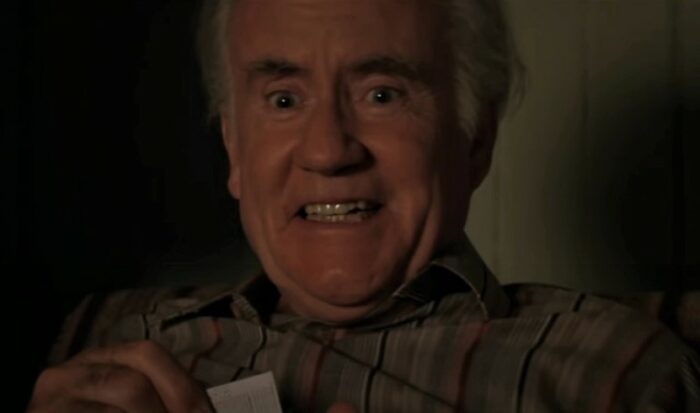
Waking Ned Devine centers around Jackie O’Shea and his best friend Michael O’Sullivan, played by Ian Bannen and David Kelly, respectively. The two pensioners realize the most recent lottery winner is living in their small town of Tulaigh Mhór (Tullymore). After some comedic attempts to suss out the recipient, they realize the ticket holder must be Ned Devine. Unfortunately, the shock of winning struck the old man stone dead. Following a dream involving Ned’s ghost, Jackie and Michael believe they have Ned’s blessing to pose as the deceased and claim the winnings. The fraud’s success soon requires the assistance of the whole town, and the community quickly agrees getting a cut of the millions is in everyone’s best interest.
Still, over the course of the film, what starts to matter most isn’t the money. The value of friendship, the importance of family, and the pricelessness of love all become apparent. However, none is ever handled in a way that leaves the audience nauseous from a gagging spoonful of sugary message. Waking Ned Devine instead sticks to its best attribute: whimsical charm.
In that respect, the movie belongs to a specific subgenre that could be called the village comedy. These films typically involve an assortment of loveable oddballs conspiring to accomplish some goal. Movies which celebrate community given that even if only a small group or individual succeeds, everyone who helped them shares in the sense of victory. Though they tend to take place in small towns, they can also occur in cities where a neighborhood is tightly knit.
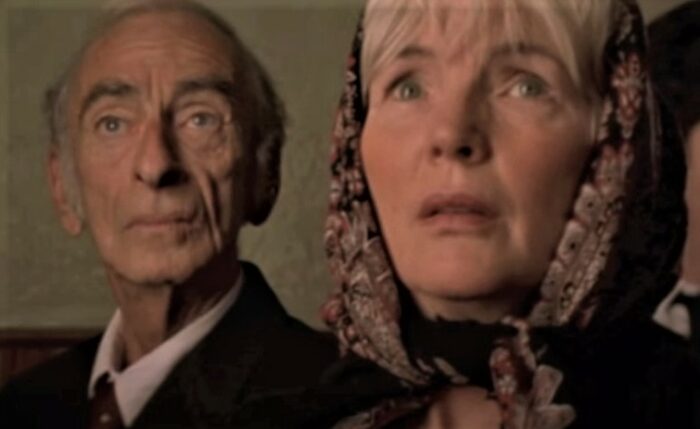
At no time did these movies dominate as much as they did in the 1990s. For a while, they surfaced annually. These included titles such as The Englishman Who Went Up a Hill and Came Down a Mountain (1995), Brassed Off (1996), and The Full Monty (1997). However, village comedies used to appear somewhat regularly with Eat the Peach in 1986 and going as far back as 1949’s Whiskey Galore! (remade in 2016).
That last is an early Ealing Comedy, an informal moniker for comedies produced by the London-based Ealing Studio.
Referring to his features, studio head Michael Balcon said, “In the immediate post-war years there was as yet no mood of cynicism… there was a mild anarchy in the air. In a sense, our comedies were a reflection of this mood, a safety valve for our more anti-social impulses.”
It’s that sentiment which runs throughout village comedies. These tend to be films about people who won’t accept reality as it is. They have a sense that things can change, and sometimes it takes a wild, audacious endeavor to do so. This sentimental anarchy allows for humor that is absurd yet charming.
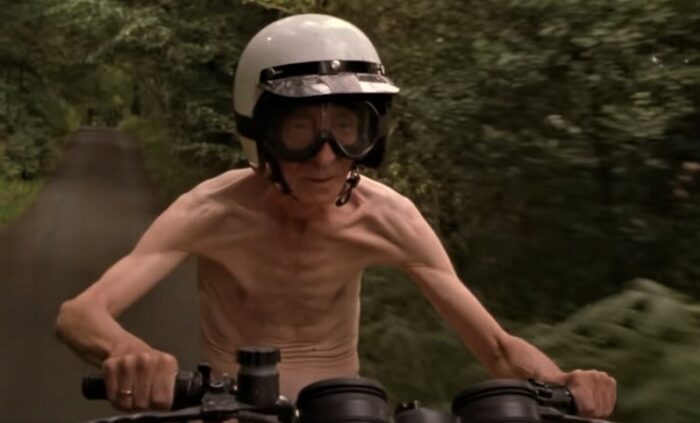
Whether it’s old men riding balls-ass naked through the town, or a village deciding fraud against the government is a victimless crime, Waking Ned Devine provides the sense that dreams are in the hands of a whole community. Rather than the rampant individualism of U.S. films, there’s a daringness in the optimism of village comedies, where one trusts their fate in the hands of others. No one is alone striving for the brass ring, and truth be told, along the way is enlightenment about what really matters in life. Jackie O’Shea, for instance, realizes his life is already special. He doesn’t necessarily need millions.
In Waking Ned Devine, such revelations are assisted by pitch perfect performances. Fionnula Flanagan plays Annie O’Shea, coming across as Jackie’s partner in more than just a romantic sense. They have the chemistry of a long-married pair who’ve schemed and fallen in love with each other more than once over the years. There’s a fabulous scene where the two discuss the possibility of Jackie going to jail that is sweet, distressing, and concludes romantically without any wasted words.
A similar sentiment is visible watching the frustrated affair between Pig Finn and Maggie O’Toole played by James Nesbitt and Susan Lynch. Theirs is a playful romance that just needs one thing to burn bright, and the frustration of that failing spark is palpable. But then let’s not forget David Kelly as Michael O’Sullivan, who manages to be comical sidekick without ever seeming lesser in the eyes of his best friend Jackie. There’s an especially poignant scene during a funeral that is both fake and real (you’ll have to see the movie to get what I mean), Jackie realizes his faux eulogy is a chance to tell his best friend those things which shouldn’t wait to be said—to tell the living while they’re alive. It’s a truly touching moment and feels real only because of the quality acting.
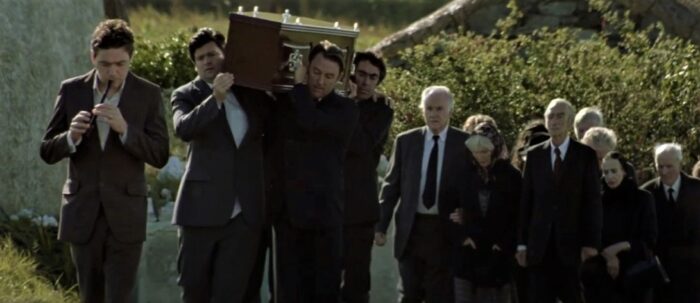
Furthermore, the whole film enjoys a tight pace. It’s one that never stops without feeling rushed. Yet, more importantly, this keeps the flick from overstaying its welcome. Whether visually or dialogue driven, scenes get to the point then move on.
For instance, (minor spoiler alert) having left Michael O’Sullivan alone with the lottery man, Jackie and Annie briefly discuss the fact Michael is not the most adept at dishonesty. It’s possible the man never told a lie in his life. Cut back to cottage, where we see Michael in the bathroom, feigning stomach troubles, so he can secretly read information about the deceased Devine. Setup to payoff happens in a few seconds and the results are hilarious, especially as Michael casually sips whiskey on the toilet while “remembering” details.
Village comedies don’t really seem to come from the United States. The closest equivalents are often features about outsiders who are, at best, condescending then come around to the realization a small town offers a charm and way of life well worth embracing. Movies like State and Main (2000), Funny Farm (1988), or Doc Hollywood (1991) which Pixar ripped off when plagiarizing the plot to Cars in 2006. The closest I’ve ever seen to a real village comedy coming from the U.S. is The Amateurs, a 2005 film starring Jeff Bridges and Lauren Graham alongside a fabulous cast, about a handful of smalltown folks trying to make a porno.
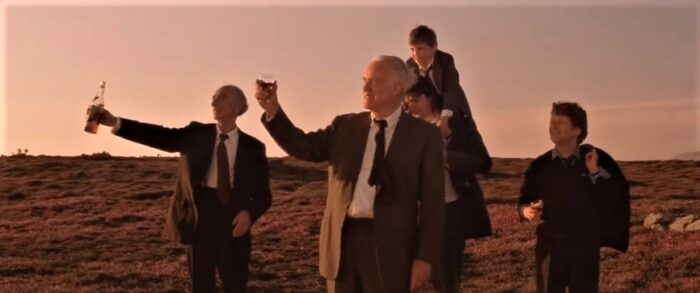
This is probably because, as Roger Ebert said it best, overseas such places are seen as “conspiracies of friends, while American small towns are so often depicted as lairs of wackos.”
On top of that, U.S. films won’t typically risk making light of a serious situation. Village comedies are often set against the backdrop of more somber circumstances. The absurdity of events is typically an attempt by all involved to break away from reality if only for a short while. Whiskey Galore!, based on a real historical event, involves a town that runs out of whiskey during World War II, so robs a cargo ship run aground on the nearby rocks. Eat the Peach and The Full Monty both involve people suffering economic hardship, the former following the brutal coal mine strikes in Britain during the early 1980s.
Yet, these bleak backdrops aren’t the focus of the films. The capers of the community attempting to escape those circumstances are. Even in lighter fare, such as The Englishman Who Went up a Hill and Came Back Down a Mountain, a town realizes they aren’t as special as they thought, so rather than accept this reality, they conspire to literally turn a hill into a mountain. Village comedies are absurdist testaments to the malleability of circumstances, even if escape is brief.
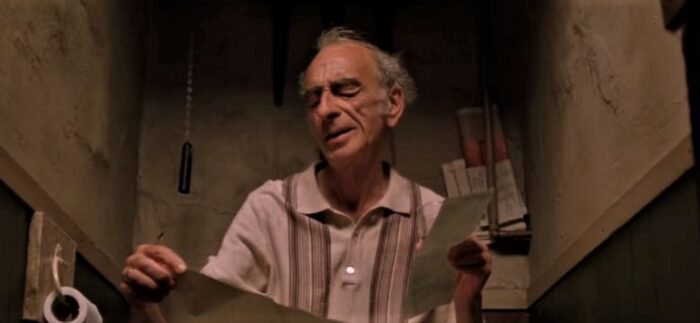
Though there isn’t an overtly bleak background for Waking Ned Devine, it does feature the lamentably universal concern for money plaguing too much of the world. Perhaps that’s what makes it special. The movie becomes more relatable in that regard. Consider, it inspired a shamelessly similarly Bollywood feature called Malamaal Weekly.
At the time of its release, critics adored Waking Ned Devine. It still holds a freshness rating of 84% on Rotten Tomatoes. Despite, perhaps, not being the first comedy which springs to mind while searching for a Friday night flick, it’s one audiences aren’t soon to forget once they’ve seen it. It’s the kind of movie that raises a smile when it surfaces in mind. Those who haven’t seen it yet are in for a treat. Not only is it a wonderful humorous film but Waking Ned Devine could be what ushers some into the fabulous sentimental anarchy of village comedies.


